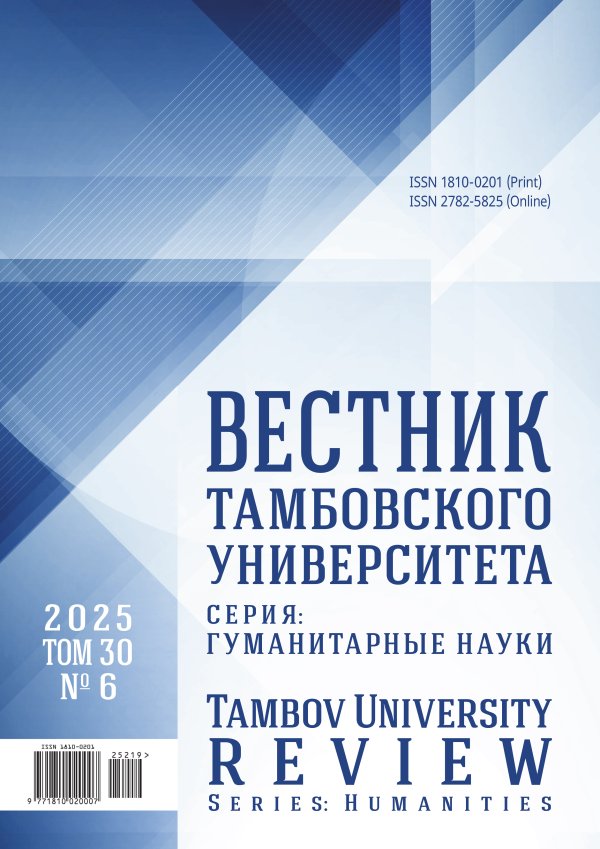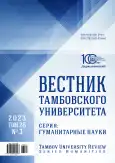Методы формирования конфликтологической компетентности воспитанников детских домов
- Авторы: Володарская Е.Б.1, Лукша С.Л.2
-
Учреждения:
- ФГАОУ ВО «Санкт-Петербургский политехнический университет Петра Великого»
- АНО ДПО «Институт изучения семьи и социальных конфликтов «БИССК»»
- Выпуск: Том 28, № 3 (2023)
- Страницы: 592-602
- Раздел: ПЕДАГОГИКА ДОПОЛНИТЕЛЬНОГО ОБРАЗОВАНИЯ
- URL: https://journal-vniispk.ru/1810-0201/article/view/297968
- DOI: https://doi.org/10.20310/1810-0201-2023-28-3-592-602
- ID: 297968
Цитировать
Полный текст
Аннотация
Актуальность. Для адаптации как в коллективе, так и в будущей самостоятельной жизни воспитанники детских домов должны обладать определенным уровнем конфликтологической компетентности, который можно развивать в рамках учебного и воспитательного процессов в образовательных учреждениях. Компетентность воспитанников детских домов – это их способность принимать решения в реальной конфликтной ситуации и предпринимать шаги для эффективного решения возникающих проблем.Методы исследования. Описаны методы мониторинга эффективности исследования путем предварительного, периодического и окончательного тестирования контрольной и пилотной групп.Результаты исследования. Проанализированы методы развития конфликтологической компетентности воспитанников детских домов, их характерные особенности и возможности применения в образовательном процессе. Подчеркнута необходимость установления некоторых критериев оценки для определения уровня развития конфликтологической компетентности на всех трех этапах исследовательского процесса. Объяснены социально-педагогические условия для эффективной реализации курса, которые включают в себя: обеспечение интенсивного цикла обучающих тренингов, предназначенных для получения и усвоения знаний и навыков, а также развитие навыков конфликтологической компетентности подростков детских домов и разработка портала данных с размещением базы знаний по разрешению межличностных, социальных и бытовых конфликтных ситуаций.Выводы. Сделан вывод о возможности эффективного повышения уровня конфликтологической компетентности воспитанников детских домов за счет реализации занятий, включающих циклические тренинги обучения и тройной мониторинг динамики его результатов.
Об авторах
Е. Б. Володарская
ФГАОУ ВО «Санкт-Петербургский политехнический университет Петра Великого»
Email: volodaelena@yandex.ru
ORCID iD: 0000-0002-8590-9680
кандидат педагогических наук, доцент, доцент Высшей школы инженерной педагогики, психологии и прикладной лингвистики
195251, Российская Федерация, г. Санкт-Петербург, ул. Политехническая, 29С. Л. Лукша
АНО ДПО «Институт изучения семьи и социальных конфликтов «БИССК»»
Автор, ответственный за переписку.
Email: s.luksza@yandex.ru
ORCID iD: 0000-0002-1888-8410
директор
195265, Российская Федерация, г. Санкт-Петербург, Гражданский просп., 113/3-72Список литературы
- Степанова О.С., Николаева А.А. Исследование конфликтологической компетентности педагогов в контексте оптимизации комфортности и безопасности образовательной среды // Педагогика и просвещение. 2019. № 2. С. 66-76. https://doi.org/10.7256/2454-0676.2019.2.29590, https://elibrary.ru/uuzhhw
- Кибальник А.В., Федосова И.В. Психолого-педагогические особенности младших подростков, склонных к аддиктивному поведению // Казанский педагогический журнал. 2019. № 2 (133). С. 87-93. https://elibrary.ru/qjdvfz
- Ávila Hernández Á.K. The evolutive dimension of conflict resolution: contributions from behavioral sciences and the analysis of animal behavior to inquiries about peace // Journal of Aggression, Conflict and Peace Research. 2022. Vol. 15. № 2. P. 85-94. https://doi.org/10.1108/JACPR-10-2021-0643, https://elibrary.ru/ynfthb
- Кашапов М.М., Лукина А.С., Махновец С.Н. Структурно-уровневая организация конфликтной компетентности в профессиональной деятельности руководителя // Вестник Санкт-Петербургского университета. Психология. 2023. Т. 13. № 2. С. 261-278. https://doi.org/10.21638/spbu16.2023.209, https://elibrary.ru/qhwtei
- Taylor L.K., Bähr C. A multi-level, time-series network analysis of the impact of youth peacebuilding on quality peace // Journal of Aggression, Conflict and Peace Research. 2022. Vol. 15. № 2. P. 109-123. https://doi.org/10.1108/JACPR-02-2022-0685, https://elibrary.ru/ffthtx
- Башкин М.В. Когнитивные аспекты поведения в межличностном конфликте студентов с высоким уровнем выраженности внутриличностной конфликтности // Общение в эпоху конвергенции технологий / отв. ред. Н.Л. Карпова, Е.А. Петрова, О.В. Зотова. М.: Психол. ин-т Рос. акад. образования, 2022. С. 303-305. https://doi.org/10.24412/cl-36917-2022-303-305, https://elibrary.ru/azgwgg
- Котова С.А., Максим В.И. Детская конфликтологическая компетентность: онтогенез и развитие, теория и практика (окончание) // Вестник практической психологии образования. 2013. № 2 (35). С. 34-46. https://elibrary.ru/raneev
- Худаева М.Ю. Психологические особенности развития конфликтологической компетентности в подростковом возрасте // Научные ведомости Белгородского государственного университета. Серия: Гуманитарные науки. 2012. № 24 (143). С. 226-229. https://elibrary.ru/rmubcr
- Вокуева А.С., Николаева А.А. О роли педагога в возникновении и разрешении конфликтов в образовательном учреждении // Бюллетень науки и практики. 2019. Т. 5. № 7. С. 390-394. https://doi.org/10.33619/2414-2948/44/50, https://elibrary.ru/xddbij
- Бандейкина Н.Н., Крюкова Т.В. Об одном подходе к оценке конфликтологической компетентности руководителя методом математического моделирования // Вестник Санкт-Петербургского университета. Философия и конфликтология. 2021. Т. 37. № 1. С. 106-117. https://doi.org/10.21638/spbu17.2021.109, https://elibrary.ru/btymcq
- Khazan B., Yustus T. Mass and Individual: Organized Conflict Against Spontaneity // Journal of Siberian Federal University. Humanities and Social Sciences. 2018. Vol. 11. № 2. P. 233-242. https://doi.org/10.17516/1997-1370-0181, https://elibrary.ru/nrowkx
- Хасан Б.И. Содержательный конфликт как условие оформления образовательного интереса и профессионального самоопределения // Актуальные проблемы борьбы с преступностью: вопросы теории и практики: материалы 23 Междунар. науч.-практ. конф.: в 2 ч. / отв. ред. Д.В. Ким. Красноярск: Сибир. юрид. ин-т Мин-ва внутренних дел Российской Федерации, 2020. Ч. 2. С. 11-13. https://doi.org/10.51980/2020_2_11, https://elibrary.ru/uyyzfm
- Заусенко И.В., Озерова Е.В. Поведение подростков в конфликте: стратегии и факторы их выбора // Психологическое благополучие современного человека: материалы Междунар. заочной науч.-практ. конф. / отв. ред. С.А. Водяха. Екатеринбург, 2018. Т. 2. С. 410-420. https://elibrary.ru/rvpiej
- Богданов Е.Н., Зазыкин В.Г. О психологии человеческих слабостей // Прикладная юридическая психология. 2020. № 2 (51). С. 88-93. https://doi.org/10.33463/2072-8336.2020.2(51).088-093, https://elibrary.ru/kciwmh
- Гришина Н.В. Человек в отношениях с окружающим миром: описания контекста // Вестник Московского университета. Серия 14: Психология. 2022. № 3. С. 22-39. https://doi.org/10.11621/vsp.2022.03.03, https://elibrary.ru/sumekg
- Цой Л.Н. Социальные инновации: разрешение инновационных конфликтов // Власть. 2018. Т. 26. № 7. С. 143-149. https://doi.org/10.31171/vlast.v26i7.5944, https://elibrary.ru/xzchkx
- Скавронская И.В., Кожухарь Г.С. Феномен конфликтного поведения личности и выбор стратегии реагирования в конфликтной ситуации // Социальная психология: вопросы теории и практики: материалы 6 Междунар. науч.-практ. конф. памяти М.Ю. Кондратьева. М.: Моск. гос. психол.-пед. ун-т, 2021. С. 517-520. https://elibrary.ru/uptcha
- Andronnikova O.O. On the relationship between uncertainty tolerance and hardiness in adolescents // Journal of Siberian Federal University. Humanities and Social Sciences. 2021. Vol. 14. № 3. P. 320-326. https://doi.org/10.17516/1997-1370-0723, https://elibrary.ru/moccre
- Шейнов В.П. Взаимосвязи виктимизации, макиавеллизма и поведения в конфликте // Вестник Российского университета дружбы народов. Серия: Психология и педагогика. 2018. Т. 15. № 4. С. 431-445. https://doi.org/10.22363/2313-1683-2018-15-4-431-445, https://elibrary.ru/vrpcsp.
- Шалагинова К.С. Гендерные особенности буллинга в подростковом возрасте // Психологическая наука и образование. 2019. Т. 24. № 4. С. 62-71. https://doi.org/10.17759/pse.2019240405, https://elibrary.ru/uwrqmz
Дополнительные файлы









